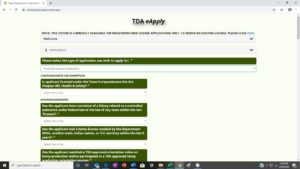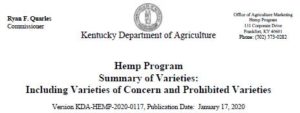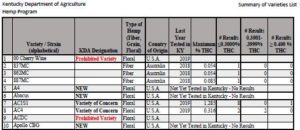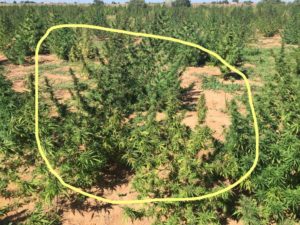Dr. Calvin Trostle, Extension Agronomy & State Extension Hemp Specialist
TAMU Soil & Crop Sciences, Lubbock, TX; (806) 723-8432, ctrostle@ag.tamu.edu
April 30, 2020
Texas Department of Agriculture Hemp Licensing
Texas Department of Agriculture opened their online portal for hemp license applications on March 16. Applications number about 600. Many applicants have received their licenses. Several are awaiting their lot permits. One grower last week noted that TDA suggested they list the full acreage of their farm (101 acres in this case) as the Facility rather than a portion of the farm in their application. This simplifies licensing if the growers needs to move to a different portion of the farm (if you don’t cross the property of others or travel a public roadway).
AgriLife Extension plant pathologist Dr. Tom Isakeit, College Station, and I met March 11 in Austin with TDA staff who are developing and managing the program. We shared our guesses at how many license applications there would be. My guess was 1,000. That was much less than I estimated last fall. I think the greatly depressed prices in the CBD market are likely the largest factor. Also, prospective growers better realize growing hemp is a lot of work, there don’t appear to be that many buyers, and the difficulties in ensuring how to get quality seed. In other words, the level of risk in growing hemp comes from several directions.
The TDA hemp page, https://www.texasagriculture.gov/RegulatoryPrograms/Hemp.aspx, now has several new items of interest. These include:
- The link for license applications. The categories are:
- Producer (at this time you also register your Facility)
- Lot permits (required after your license application is approved)
- Handler
- Handler/Sampler
- A required 24-minute video you must watch before application. This video is very informative. Even if you are not planning to apply for a license but have an interest in hemp, I recommend you watch the video
- The list of TDA approved hemp varieties for Texas. There are now 306 approved varieties as of April 30. See below for further information. Being designated as an approved variety does not mean that TDA endorses a particular variety. Rather, the information they require in order to be approved was provided by the entity that markets the seed. Nothing more. The variety is not (yet) a certified variety. Certification means genetic purity and seed quality standards must be met. There is neither regulation nor certification of either characteristic as an approved
- The fully adopted rules as published in the Texas Administrative Code. If you relied on the Texas Register in the past, this is better. Texas Register only published changes and updates to the proposed hemp rules. Though this website is fragmented (sub-links to ten subchapters) it is a complete set of the rules anyone involved in hemp in Texas must adhere to.
Texas Department of Agriculture and “Approved” Hemp Varieties
TDA rules state that only certified or approved varieties may be planted in Texas for 2020 hemp. There are no certified varieties yet in Texas. (Some varieties might be certified in other states.) In my March newsletter I commented about Sunbelt Hemp having the first certified hemp varieties for Texas. Dr. David Baltensperger, chairman, Texas A&M Dept. of Soil Crop Sciences, who sits on the Texas State Seed & Plant board, clarified that their approval of the Sunbelt Hemp lines enables Sunbelt to produce seed that can be certified in Texas. This includes Sunbelt submitting a reference sample of the seed to TDA. Anticipate that Sunbelt’s Texas certified seed could be available in 2021.
As of April 30, TDA lists 306 approved hemp varieties for Texas. The full list is at https://texasagriculture.gov/Portals/0/forms/COMM/Hemp/TDA_Approved_Hemp_Varieties_04-30-20.pdf This high number does not likely represent nearly that many varieties. There are 29 approved varieties with ‘Cherry’ in the name. This is due to Cherry Wine being an early and common variety for CBD production. (Some growers have cautioned me that Cherry Wine can readily “go hot,” producing too much THC. This could be due to genetics or perhaps impurity of seed. See Kentucky Dept. of Ag. comments about this variety below.)
Kentucky Dept. of Agriculture 2020 Hemp Variety Assessment—“Prohibited” and “Concern”
In January 2020, the Kentucky Dept. of Agriculture posted “Hemp Program Summary of Varieties: Including Varieties of Concern and Prohibited Varieties.” See
https://www.kyagr.com/marketing/documents/HEMP_LH_Summary_of_Varieties_List_2019.pdf The document lists the 305 varieties legally grown in Kentucky 2017-2019. Based on THC testing, 27 varieties are prohibited in Kentucky, and 39 more are designated as ‘Varieties of Concern.”
Prohibited Varieties in Kentucky, according to Doris Hamilton, Kentucky Dept. of Agriculture (via an e-mail shared with Univ. of Kentucky’s Dr. Bob Pearce) are excluded from legal planting based on the following criteria:
- At least 1 test result above 1% THC and at least 49% of the samples tested above 0.3% THC, or;
- More than 65% of the samples tested above 0.3% THC and the Maximum THC was more than 0.5%, or;
- More than 80% of the samples tested above 0.3% THC and at least 2 test results were above 0.4% THC.
Varieties of Concern in Kentucky had at least one test > 0.3% THC.
Can the Kentucky data tell us anything about the Texas approved varieties?
To some extent, yes. Of course, production conditions in Kentucky are different. And no hemp varieties have yet been tested in Texas. Furthermore, many varieties not harvested in timely fashion are more likely to go hot. Late harvest leading to too-high THC is not fully the fault of the variety (but includes the grower).
Most hemp varieties listed in the Kentucky document are also on the approved Texas Dept. of Agriculture list. However, note the following:
Cannabinoid Hemp Varieties
- Twelve cannabinoid varieties listed as approved in Texas are Prohibited in Kentucky. (In alphabetical order: 00 Cherry Wine, ACDC, BaOx x Autoflower, Cat’s Meow, CBDawg/CBDawgL, Cherry, Fall Bloom, Hempress, Merlot/Merlot D, Otto II Stout, Suver Haze, Wild Bourbon.
- Because these varieties are Prohibited, the statistics are not provided for the frequency and levels of high THC.
- Eighteen more cannabinoid varieties listed as approved in Texas are designated a Variety of Concern in Kentucky. (Two more. Midwest and Northwest need to be clarified as Kentucky lists these with ‘Strain’ in the name.) The four most tested cannabinoid varieties in Kentucky, 2017-2019, are all designated Variety of Concern (three approved in Texas):
- T1 (also labeled as Trump 1): 294 samples, 42.5% of samples above 0.300% THC and 14.6% above 0.400% (maximum about tested, 2.444% THC)
- BaOx (also approved as Boax in Texas): 136 samples, 26.5% of samples above 0.300% THC and 6.6% above 0.400% (maximum about tested, 0.987% THC).
- Cherry Wine: 130 samples, 36.9% of samples above 0.300% THC and 17.7% above 0.400% THC (maximum amount tested, 2.718% THC). Doris Hamilton, Hemp Program director, Kentucky Dept. of Agriculture has noted the following for Cherry Wine: “(Responding) to questions about Cherry Wine, first, KDA considers 3 years’ worth of data. Cherry Wine didn’t really test high until 2019, and those frequent high THC tests were tracked to one irresponsible seed supplier.”
- Sweetened (not approved for Texas in 2020): This was the most tested variety in Kentucky. 371 samples, 22.6% of samples above 0.300% THC and 7.3% above 0.400% THC (maximum amount tested, 1.272% THC).
- Two somewhat common cannabinoid varieties in Kentucky, which are approved in Texas, stand out over 2017-2019 because they had not a single THC sample >0.300%:
- Martha, 55 tests, zero hot samples, maximum THC recorded was 0.187%.
- Mary, 49 tests, zero hot samples, maximum THC recorded was 0.204%.
- Remember, though, it takes only one company selling seed with contamination from a THC-prone variety (or worse, marijuana contamination) or one grower letting their crop go too long to test >0.3% and result in a default crop destruction order.
Fiber Hemp Varieties
- Among the 16 fiber varieties reported in Kentucky that are also approved in Texas, six are a Variety of Concern. These 16 varieties were tested anywhere from one to 26 times. (This documents that just because a variety is not for cannabinoid production there is still risk with THC.)
- Most of the positive tests for THC came from two Australian varieties, which were two of the top three tested varieties. (CHG, 26% of samples above 0.300% THC, maximum THC = 0.749%; CHY: 31% of samples above 0.300% THC, maximum THC = 0.465%.)
- Other common fiber varieties in Kentucky that had few or no tests of THC > 0.300%, which are approved in Texas, include: Tygra (two of 25 samples above 0.300% THC), Fibranova (21 samples, maximum THC 0.101%), and Eletta Campana (10 samples, maximum THC 0.097% THC; this entry is also mis-spelled as an additional approved Texas variety ‘Elletta Campana’).
Grain Hemp Varieties
- The same 13 grain varieties tested in Kentucky are all approved in Texas. Not a single sample among 23 total samples had a test THC >0.300%. Only two varieties tested above 0.1% THC, the highest being 0.212% THC.
Please recognize that as growers strive to increase the hemp plant’s CBD (or other cannabinoid) content, there is risk of potential increase of THC levels. Therefore, established growers in many states test their hemp weekly starting a few weeks after flowering. It requires time and cost to do so. But it is truly a small fraction of overall costs and minor relative to cannabinoid crop value. You do not need a large acreage to justify sampling each variety of your crop. Consider this even if you have less than on acre. This may be especially true if you are a first-time grower (which we all are) and you are growing a different variety for the first time.
Here’s another example how this data might be limited: Reports from several states indicate BaOx is a good CBD hemp variety. But in Kentucky it is a Variety of Concern. In Pennsylvania BaOx is prohibited. Seed dealers for BaOx believe most of this concern stems from impure seed (see results, Fig. 1).
I have already bought a variety that is Prohibited or a Variety of Concern in Kentucky
What should you do? You probably can’t and shouldn’t necessarily return the seed. Just know that some evidence suggests you have a variety that might be more prone to higher THC. Unless you see a visual difference among plants (or poor germination?) you may never know if your seed was impure. But you can ensure you conduct timely harvest to reduce the potential for THC >0.300%. You may decide to do some extra sampling prior to notifying the sampler or TDA for collection of your required official sample for THC.
Later this season, I imagine a sound approach that new Texas hemp growers should consider: “If you are wondering or worried if you should set your harvest date thus triggering your official sample collection for THC, go ahead and do it.” Schedule your testing. So, you will notify TDA and have your hemp crop sampled by a licensed sampler within 15 days before harvest. As your THC level rises toward and past 0.2%, your upside potential benefit becomes small, and your downside could be total loss (if hot).
Fig. 1. This New Mexico field in 2019 was planted with a variety for CBD hemp which had high contamination in the seed with other varieties. There appear to be five distinctly different plant types in the outlined area.
Texas A&M AgriLife Hemp Variety Trials—Protocols are Complete
As noted before, Texas A&M AgriLife is offering first-year hemp variety trials in 2020 for cannabinoids, fiber, and grain varieties. The locations are Plainview and San Angelo (both irrigated) and Commerce and College Station. We will add South Texas testing in 2021.
This work is developed under the long-time Texas A&M AgriLife Crop Testing Program. This self-supporting program has offered public variety trials for grain sorghum, corn, sunflower, soybean, etc. for decades.
We reviewed the methodology of the few hemp variety trials to date conducted in other states. We seek a balance between a bare-bones approach vs. an intensive assessment of hemp variety growth and performance. We must also adequately assess any potential to develop THC. You may access the hemp variety testing program information at http://varietytesting.tamu.edu/hemp This includes: 1) the program description, location details, fees, and seed instructions, 2) the entry form, and 3) a seed company/Texas A&M AgriLife grower agreement
Texas A&M AgriLife’s goal is to provide producers, hemp seed companies, and the larger hemp industry with reliable, independent scientific assessment of hemp varietal performance in Texas. Coupling these results with my 21+ years of Texas Extension agronomy work as well as the full expertise and resources of Texas A&M Agriculture will advance hemp in Texas. We look forward to the opportunity to collaborate with you in developing hemp information for Texas.
If you have questions about the program and protocol, please e-mail or call, 806.777.0247 (cell). Due to the urgency to get trials planted in May, the due date for receiving entry form, seed, and payment is May 12. If you are interested in participating, please notify me as soon as you can as we are working on the individual sites for field preparation.
Ongoing Texas A&M AgriLife Extension Hemp Resources
We continue adding resources at http://agrilifeextension.tamu.edu/hemp including under ‘Hot Topics & Latest Updates’ on the main page. Further production updates will be posted the week of May 4.
Discussion of TDA Final Hemp Rules
Texas A&M AgriLife Extension agricultural law specialist Tiffany Dowell-Lashmet, and Extension ag. economist Dr. Justin Benavidez discuss by video the final TDA rules. https://agrilifeextension.tamu.edu/browse/hemp/videos/video-summary-of-the-texas-department-of-agriculture-regulations-for-industrial-hemp/
Our Hemp Program Twitter Account
My staff has established @TXAgriLifeHemp We will start working with the account the week of May 4 to provide regular updates on Texas hemp.
Do you have hemp questions?
You may find regional and topical Texas A&M contacts for hemp at https://cdn-ext.agnet.tamu.edu/wp-content/uploads/2020/02/AgriLife-Hemp-Resources-Personnel-2020-02Feb10-Trostle.pdf
If you have a question that we can include in our Twitter communication or via this newsletter, please e-mail Calvin Trostle
Upcoming Texas A&M AgriLife Extension Hemp Programs
We regret our scheduled late March and April education programs were canceled by COVID-19. Stay tuned for forthcoming Zoom updates in May.
** ** **
A summary of key recent comments with Texas hemp growers and your questions:
- Several common initial questions to AgriLife regard someone only now starting to think about growing hemp. There is a lot of planning involved. Trying hemp in Texas in 2020 becomes even more difficult if you don’t have the needed planning and preparation. If you waited until April or even back in March after the TDA licensing process began, you are not in a good situation. It is late, even too late, to now begin planning a 2020 grow. You still must get a license and permits from TDA, which may still take a couple of weeks. We believe planting hemp in many areas of Texas is potentially already late from what AgriLife may recommend moving forward. There is the issue of getting seed. Don’t be afraid to “miss out” on first-year production.
- A grower in Coastal Texas planned 40 acres for CBD production. He initially called AgriLIfe to discuss a seeding rate. We learned he didn’t know for sure what seed he had. Was it feminized seed, or straight run seed (it was)? How was he going to plant it? (He intended to use an older plate planter rather than an air-vacuum planter that is much better at metering specific amounts of seed.) There was little understanding about harvest or drying the crop. And certainly, about whether he could handle this as a hand-harvest operation. Or where there would be enough drying space. He did not have a contract with a buyer.
This grower’s intentions were good. He is interested in learning about hemp and its possible value to him as a rotational crop. Dr. Reagan Noland, San Angelo, and I answered the above questions. But we went further in strongly suggesting he grow only five acres, perhaps 10 at the very most in 2020. And there probably isn’t any profit here (unless the market improves a lot through the year). He will learn the same things on five acres. It will be more manageable. This is probably not what the farmer wanted or expected to hear.
- Several hemp inquiries since January are from individuals with access to a few acres, most likely owned by a relative. “We could grow hemp there.” I ask about the condition of the land, what is being done with it now. Most of the time it is in grasses and sometimes weeds. Nothing actively done for several years. AgriLife is doubtful this type of land will grow a decent hemp crop the first year. It is out of condition. We don’t know what to expect. It doesn’t appear it would give a finicky and sometimes fragile hemp seedling a favorable home to germination and growth. Though there may be proper interest in hemp and a keen desire to learn, this doesn’t seem like a means to optimize all that you can for hemp production.
These types of questions and our discussion may be like your experience. A would-be grower with a late start, an undeveloped plan, or a less than optimum location may still decide to give it a try. If you do, Texas A&M AgriLife will still help you as best we can as you work through additional questions and how to best manage your hemp crop.
“Texas A&M AgriLife Extension provides equal opportunities in its programs and employment to all persons, regardless of race, color, sex, religion, national origin, disability, age, genetic information, veteran status, sexual orientation, or gender identity.”
The Texas A&M University System, U.S. Department of Agriculture, and the County Commissioners Courts of Texas Cooperating.



